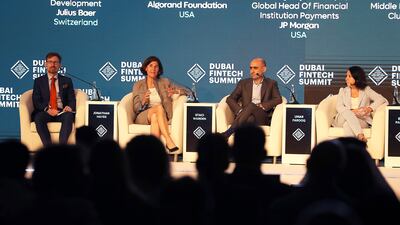Governments need to develop regulatory frameworks for Web3 assets as early as possible and not wait until the sector has perfected itself, experts said during a panel discussion at the Dubai FinTech Summit on Monday.
In many developed markets, regulators are slower to respond as they are trying to understand different components of Web3, said Ebru Pakcan, Citi UAE's managing director for Middle East and Africa.
“The challenge with that is the innovation is not stopping; the innovation continues,” she said.
“So, the later the framework comes, the more exceptions are actually evolving and growing. I think moving fast is important.”
Web3 is the emerging third generation of the World Wide Web, with blockchain, decentralisation, openness and greater user utility among its core components.
Its market size is expected to be valued at about $6.2 billion in 2023 and grow at a compound annual rate of 44.6 per cent from 2023 to 2030, according to Market Research Future.
Although there is more work to do in the traditional finance space, it is important for governments and society as a whole to think about how to work on responsible digital asset development in Web3, Ms Pakcan said.
“The most recent examples are showing us that the most vulnerable are likely to be the consumers who are already challenged with lack of financial inclusion,” she said.
Explaining the fundamental differences between the current financial system and Web3, or decentralised finance (DeFi), Jonathan Hayes, head of digital assets development at Swiss private bank Julius Baer, said that while DeFi has been rich in innovation, it has fallen short in terms of financial responsibility and money laundering protection.
DeFi is a completely isolated world in which you can speculate in virtual assets, and it lacks any links to physical assets, Mr Hayes said.
However, financial services will help to tokenise assets and bring them on to the blockchain, he said.
“On the other hand, banks are not really the most innovative, but primarily set up for stability and to conduct business in a regulated manner,” he added.
“Financial services can profit from the decentralised finance system and bring more innovation to the offering, but I think it’s going to be a long process.”
The idea of a Web3 blockchain-based environment is to obviate the need for trust, according to Staci Warden, chief executive of Algorand Foundation.
“The stuff that has happened this year in crypto, I would argue, is really just about fraud. Like you'd see anywhere, just happens to be around digital assets,” she said.
“Fraudsters are fraudsters, maybe it's very important to go after those people wherever they are.”
Blockchain is different from traditional financial services because several parties record transactions on a single ledger, Ms Warden said.
Not one entity controls the ledger and that is where decentralisation becomes fundamental to Web3, she said.
Umar Farooq, chief executive of Onyx by JP Morgan and global head of financial institutional payments, said the vast majority of users were also not tech-savvy.
Although banks and regulators are fundamentally in the business of trust, lenders continue to find ways to mess up on a regular basis, he said.
“Therefore, regulation is key because otherwise people will continue to default back to centralised finance to interact with DeFi. Without proper regulation, oversight and clarity on a global level, you will continue to run into fraud,” Mr Farooq said.


